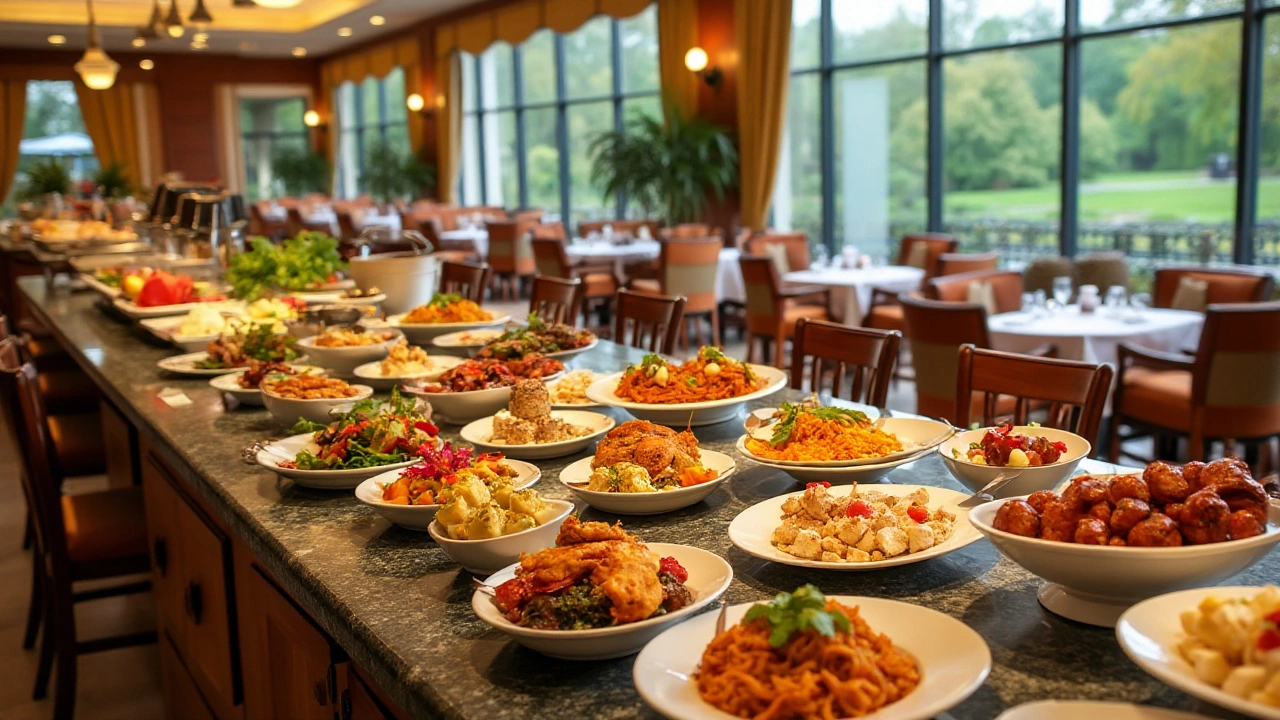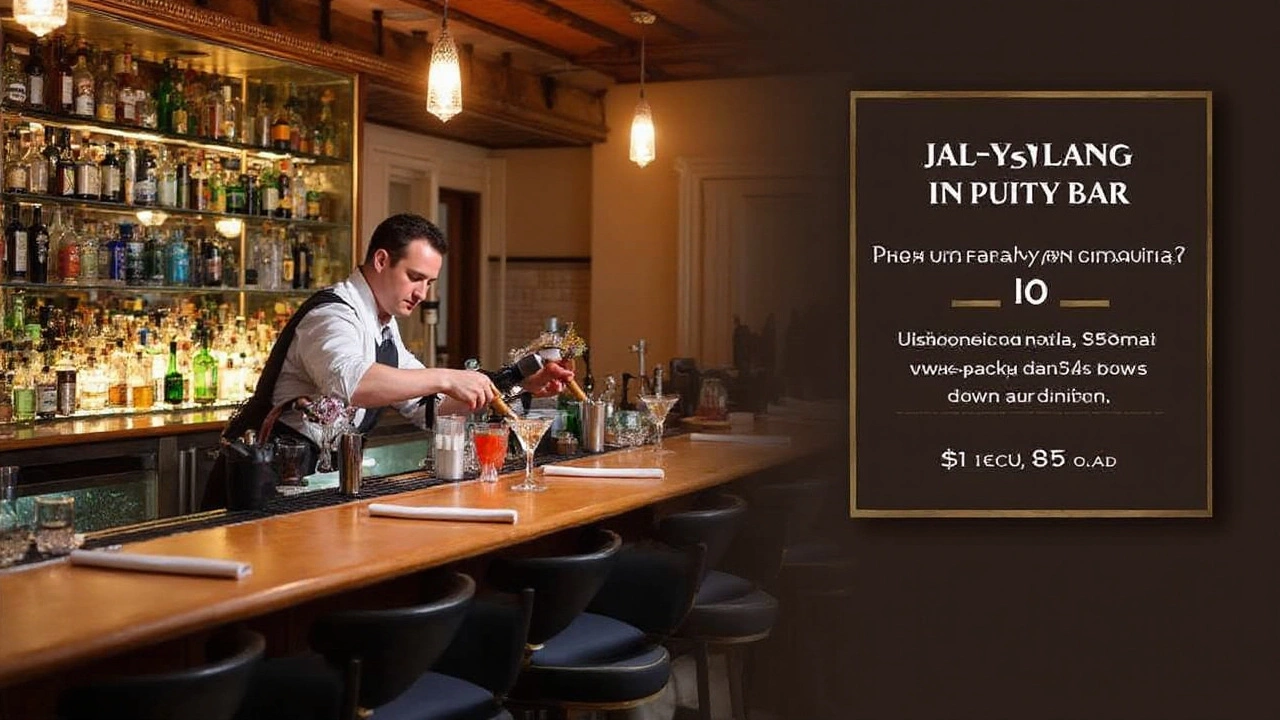Understanding All-Inclusive Hotel Packages: The Eating and Drinking Experience
 Nov, 4 2024
Nov, 4 2024
Travelers seeking comfort and value often turn to all-inclusive hotels, attracted by the promise of easily accessible meals and drinks. But as anyone who has booked a vacation package knows, the term 'all-inclusive' can sometimes leave room for interpretation.
While the buffet spreads and bottomless mimosas are the classic images associated with these packages, reality can differ based on the destination and hotel. It's essential to delve deeper into what's actually covered, understanding the distinctions between unlimited and limited offerings, and the possible terms and conditions tied to these tantalizing perks.
This article sheds light on the culinary workings of all-inclusive hotels, helping travelers paint a more accurate picture and make the most of their dining experiences when staying at these enticing venues.
- Understanding All-Inclusive Basics
- Types of Meal Options
- Beverage Inclusions
- Common Limitations
- Tips for Making the Most of Your Stay
- Comparing All-Inclusive to Other Plans
Understanding All-Inclusive Basics
The term all-inclusive is like a magic wand in the world of travel, conjuring images of crystal blue pools, endless buffets, and exotic cocktails served under swaying palm trees. However, understanding the true scope of an all-inclusive package requires a closer look. At its core, these packages are designed to simplify your travel by bundling accommodation, meals, drinks, and often some activities into a single price. This means no surprises or hidden costs along the way, making your budgeting as easy as pie.
For those new to this travel style, it's crucial to recognize that not all all-inclusive deals are created equal. The basics usually cover three daily meals—breakfast, lunch, and dinner—along with local alcohol and non-alcoholic beverages. Yet, this can vary dramatically from one hotel to another. Some high-end resorts may offer 24-hour gourmet dining and premium drinks, while others may have specific hours when food and beverage services are available, with limitations on specialty dining or imported alcoholic spirits. An important element of these packages is the convenience factor, allowing travelers to indulge in their holiday without constantly reaching for their wallets.
The all-inclusive concept has transformed over the years. Originally born in the 1950s in the Caribbean, all-inclusive resorts have now spread globally, becoming a staple of modern travel. These venues cater to different kinds of travelers, from families and honeymooners to solo adventurers. One might wonder, why has this concept become so popular? The answer lies in the ease and peace of mind it provides. You check-in, unpack, and let the carefree atmosphere take over. Travelers relish the opportunity to experience local culture through authentic meals without leaving their hotels.
"The appeal of all-inclusives comes from combining convenience with a sense of indulgence, allowing guests to enjoy more vacation with less hassle," says Loren Boone from The Traveler's Choice Magazine.
For anyone considering an all-inclusive stay, it is also essential to note the added perks beyond just meals and drinks. Many packages include access to hotel amenities like pools, gyms, and entertainment sessions. Others may offer excursions, water sports, or spa treatments either included or at a reduced cost. Understanding what your package covers can make or break the all-inclusive experience. It's always wise to read the fine print, ask questions before booking, and tailor the experience according to personal preferences and dietary needs.
Types of Meal Options
In the world of all-inclusive hotels, the way meals are presented can vary widely, offering an intriguing playground for both gourmands and those simply keen on convenience. At some properties, the dining options feel like a grand tour of global cuisines, with buffets featuring dishes from across continents. Breakfasts are usually a tantalizing spread—think freshly baked pastries, cereals, and made-to-order omelets sizzling with choice ingredients—all without the worry of a hefty bill at the end. Yet, the experience doesn't stop at buffets; some hotels offer à la carte restaurants on-site, usually requiring a reservation, adding a touch of exclusivity and specialization to the all-inclusive experience.
An interesting aspect for many travelers is how different types of cuisine are covered within these packages. Some resorts pride themselves on offering a taste of the local culture, showcasing national specialties alongside classic international fare. For instance, in a Mexican beachside resort, it’s not unusual to find a corner of the breakfast buffet dedicated to scrumptious chilaquiles and other authentic bites. Meanwhile, sushi bars might coexist with Mediterranean bistros and American steak houses, each bringing a unique vibe and flavor spectrum.
Now, while the buffet might seem ubiquitous, it's just part of a broader culinary tapestry that these hotels weave to keep guests satisfied. Many establishments boast diverse food stations or themed nights—pasta night, anyone?—that keep the dining experience dynamic. Early risers might savor the quiet moments with fresh fruit and coffee while night owls enjoy vibrant late suppers. These small variations in timing reflect an emphasis on freedom and choice, providing a customizable dining experience for every traveler's routine.
Yet, it's essential to highlight that not all hotels uphold the same standards or deliver equal quality in their meal services. Some might limit the guests to specific hours or restrict access to certain dinner settings, keeping them as special privileges for members or those willing to pay extra. Often, signature or gourmet restaurants require prior booking, and certain premium items may incur additional costs. To avoid unexpected surprises, it’s beneficial to read the fine print or chat with the resort staff upon check-in—an orientation of sorts that ensures a seamless experience.
It’s worth noting that some guests might have special dietary needs or preferences, which brings us to an important consideration in the realm of all-inclusive. Increasingly, hotels are tailoring their offerings to cater to vegetarians, vegans, and those with allergies, ensuring not only diversity in flavors but inclusivity in their services. In some locations, dedicated sections stock meat-free, dairy-free, or gluten-free alternatives. Exploring these aspects of a package can lead to delightful discoveries.
In the end, the variety included in these meal options isn't just about preventing hunger—it’s about transforming dining into an integral part of the holiday experience. Enjoying a wood-fired pizza under a starlit sky or sampling exotic fruits by a shimmering pool only adds to the charm. So, whether you're the adventurous eater or look forward to homey comforts, all-inclusive services seek to not only meet but often exceed culinary expectations, an aspect worth savoring for the interested traveler.

Beverage Inclusions
The allure of an all-inclusive vacation package often includes the promise of free-flowing drinks available with just a wave of your room key. This intoxicating feature is a key reason why many choose to book their trips with all-inclusive hotels. However, the variety and availability of drinks can vary greatly, depending on the destination, hotel chain, and specific package deal. Heading to the beach bar to grab a pina colada might seem like a given, but it's crucial to understand what 'all-inclusive' truly entails when it comes to beverages. While most establishments offer a range of drink options—from sodas and beers to premium cocktails and fine wines—it's always wise to check the specifics to avoid surprises. Some resorts may include everything in their packages, while others could limit the types of drinks available or place restrictions on times they can be served.
For instance, luxury resorts might include an impressive selection of international liquors and craft cocktails, while others may stick to local brands. Resorts in the Caribbean are known to typically offer rum-based concoctions to their guests, making use of the region's famed spirit, often without extra charges. However, this might not be the norm everywhere. It's not uncommon for some hotels to limit premium liquors or certain cocktails, presenting them as part of an 'extra' package for guests willing to pay a bit more. Knowing this ahead of time can help travelers plan and maximize their relaxation time by the pool or beach bar.
Many travelers are surprised to find out there are certain limits to what 'unlimited' drinks can mean. As travel expert Susan Barnes notes, "Not all beverages are created equal, and what's included can depend on the tier of your package and the resort's policies."It's always helpful to clarify with the hotel beforehand what is covered in your all-inclusive deal and if there are specific packages that cater to your preferences.
For those who appreciate data-driven insights or are just curious about the finer details, here's a quick look at how drink options might vary:
| Resort Type | Inclusions | Limitations |
|---|---|---|
| Budget Resort | Sodas, local beer, and house wines | Imported spirits available at extra cost |
| Luxury Resort | Wide array of local and international cocktails | Premium wines and spirits sometimes require an upgrade |
| Adult-Only Resort | Signature cocktails and mixers | Limited late-night options |
Such data can assist travelers in setting their expectations correctly. Understanding these nuances ultimately ensures guests can savor their all-inclusive experience fully. Cheers to well-informed traveling!
Common Limitations
When booking a stay at an all-inclusive hotel, it's important to be aware of certain common limitations that could influence your overall experience. While the promise of endless buffets and free-flowing drinks sets a delightful stage, the reality can sometimes come with minor constraints. One such limitation isn't always apparent from the get-go: meal timing. Many all-inclusive accommodations offer meals during set times, meaning those with late-night cravings might find options limited. Outside of traditional meal hours, guests might only have access to snacks or room service, often at an extra cost. This can be a significant consideration for night owls or those on different time zones.
Another common limitation lies in drink offerings. While many hotels boast unlimited drinks, the menu might not include certain high-end brands. Often, guests have access to house brands only, with premium labels incurring extra charges. Cocktail lovers should note that specialty drinks might be part of this category, making it essential to check the specifics upon arrival. A recent study showed that around 35% of all-inclusive guests are surprised by extra charges for particular liquors and wines. Therefore, reviewing the drinks list early in your stay can help manage expectations and avoid unexpected expenses.
The popular travel site, Frommer's, advises, "Before you dive into that sun lounger with a cocktail in hand, clarify what exactly your 'unlimited' entitlements are. You might find top-shelf spirits come with a surprise price tag."
A further area where limitations frequently arise is in specialized dining experiences. Many all-inclusive resorts offer unique dining venues, such as à la carte restaurants, which require reservations. These reservations might be limited to a specific number of visits per stay, contingent on your room package. It's not uncommon for guests to face fully booked slots, especially during peak holiday weeks. This can influence your choices and potentially add costs if alternative meals are desired outside the included venues. As such, securing reservations at check-in, or even prior if allowed, can be a strategy to ensure access.
There's also the element of activity restrictions. While guests often anticipate a suite of recreational options included in their stay, some high-energy activities, like scuba diving or motorized water sports, typically come with additional fees. It's also good practice to verify if any cultural tours or off-resort excursions are truly all-inclusive. The range of what is offered can differ greatly between resorts and is often dictated by location, resources, and intended guest experiences. Understanding these limitations is key to fully enjoying your stay without unwanted surprises. Reach out to the resort staff; they are an invaluable resource for clarifying what's included and how best to navigate your access to all amenities offered.

Tips for Making the Most of Your Stay
Staying at an all-inclusive hotel is an opportunity to immerse yourself in a carefree environment where meals and drinks are at the ready. Yet, to optimize this experience, a bit of planning and smart choices can go a long way. First, familiarize yourself with the dining options available at the property. Check if they have multiple restaurants with varied cuisines. While the buffet might have a vast selection, à la carte restaurants often provide a more intimate and specialized dining experience. Reservations might be required, so book your spots early after your arrival to avoid disappointment.
Understanding the meal schedule is another essential step. All-inclusive hotels typically have specific hours for breakfast, lunch, and dinner. Knowing these times will help you plan your daily activities efficiently around your meals. Additionally, take advantage of any late-night snacks or afternoon teas offered by the hotel. These can be delightful ways to recharge after a day of excursion or relaxation by the pool.
When it comes to beverages, ask if there are any high-end options not included in the package. While most hotels offer a range of local spirits, wines, and beers as part of their all-inclusive deal, some premium liquor and cocktail options might come with an extra charge. If you're a cocktail lover, find out if the hotel hosts any mixology classes or happy hour events where you can try different concoctions, possibly at a discount or within your package.
Nicholas Gill, travel writer for The New York Times, once noted, 'A good all-inclusive is one that surprises you — be it with a spectacular meal or a cocktail better than anything you’d hope to find in a local bar.'
Paying attention to guest reviews can also provide insights into the dining and drinking scene on offer. Previous guests often share their experiences about the must-try dishes, popular drinks, and hidden gem spots within the hotel. This firsthand advice can be just as valuable as any guidebook recommendation. Additionally, if you have any dietary restrictions, informing the hotel beforehand can ensure they accommodate your needs without hassle.
Crafting your own adventure around the services available can be a rewarding way to make the most of your time. Participate in themed dinner nights or cultural food events that some hotels organize, which can enrich your culinary experience and offer a taste of the local culture. And don’t forget to unwind and simply savor the freedom of not having to worry about meal plans or tabs — a small yet significant luxury that adds to the charm of an all-inclusive stay.
Comparing All-Inclusive to Other Plans
When planning a vacation, the options are plentiful, but the choice between an all-inclusive package and other plans like half-board or à la carte can shape your holiday experience in significant ways. The main attraction of an all-inclusive stay is the ease and convenience it offers. You arrive at your destination, and from meals to drinks and often entertainment, it's already taken care of, allowing you to focus on relaxation and enjoyment. This can be a relief for those who want to avoid daily budgeting and prefer knowing exactly what their trip will cost from the get-go.
In comparison, half-board options typically cover breakfast and one other meal, usually dinner, giving travelers the flexibility to explore the local cuisine for other meals. This approach appeals to those adventurous souls who enjoy sampling flavors unique to their destination. Meanwhile, a full-board option includes three meals a day, but might still not cover drinks like cocktails or snacks. The à la carte model, on the other hand, involves paying for each meal and drink separately, offering the utmost freedom of choice. However, this can quickly add up, especially in tourist hotspots where meal prices tend to soar.
"The beauty of traveling doesn’t just lie in the sights you see, but in the tastes you savor." – Travel Weekly
Some travelers value all-inclusive packages for the valuable time they save. There's no need to hunt for restaurants or make reservations in a foreign language, and families with children often find this setup maximizes their relaxation time. With kids’ clubs and scheduled activities to keep little ones entertained, parents manage to sneak in some adult fun, hassle-free. Interestingly, statistics show that 70% of family travelers prefer to book all-inclusive stays, precisely for this reason.
Cost comparisons can be useful when deciding. While initially, an all-inclusive might seem pricier, it frequently offers better value when considering the added expenses of ordering meals and beverages, which may not always be controlled as planned. There are destinations, like the Caribbean or Mexico, famed for their all-inclusive resorts, where guests enjoy sumptuous buffets, unlimited drinks, and entertainment programs that outshine their separate counterparts. Yet, these might not be the ideal option for those visiting places where exploring local eateries and culture forms a vital part of the travel experience.
It’s essential to research thoroughly and consider your travel style when choosing between these plans. While some travelers revel in the surprise and spontaneity of dining at different places, others find comfort in the consistency offered by all-inclusive hotels. So, the next time you book a getaway, weigh these options thoughtfully. Understanding the differences in meal plans can enhance your vacation immeasurably, ensuring your trip is everything you hope it will be.